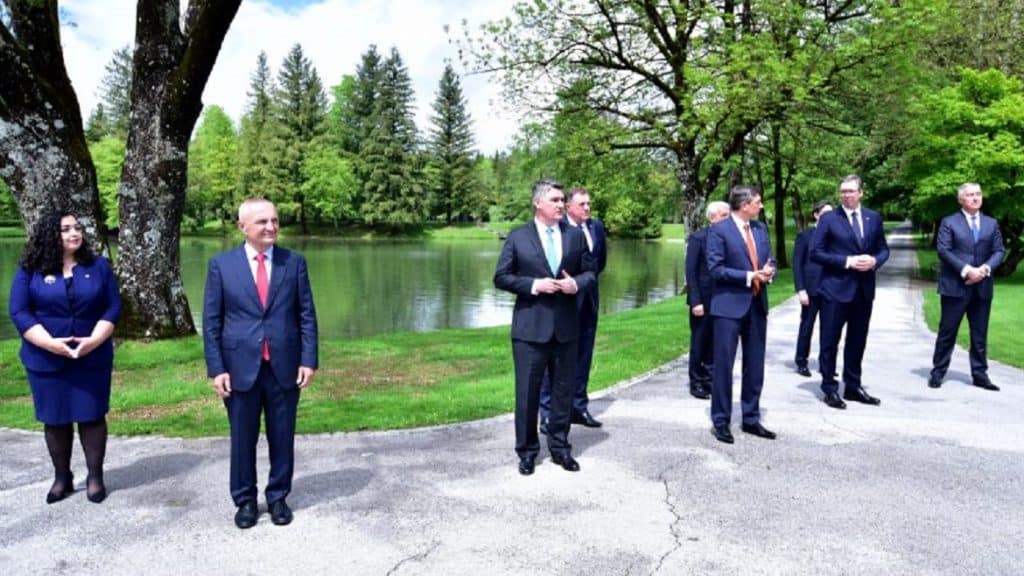By Nikola Mikovic
“For the Balkans, European integration has no alternative” is a mantra regional and European officials have been repeating for decades. Meanwhile, the United Kingdom left the EU, and several Balkan nations remain stuck in the EU’s “eternal waiting room”. But what if Brussels has an elegant solution for the region?

The EU leaders often talk about the Balkans’ “European future”, and stress the need for the region to “stay on the European path”. But “European future” and “European path” is not the same as the full-fledged EU membership. Nowhere is that more obvious than in the case of North Macedonia. Skopje has fulfilled all the EU demands, and has even changed the country’s name in order to join the EU. However, Bulgaria has blocked the start of North Macedonia’s EU accession talks last year, citing disputes over its history, language and identity. Albania is in a similar position. In 2019 French President Emmanuel Macron blocked both Albania and North Macedonia from moving forward with their membership bids, allegedly due to lack of reforms. Serbia started negotiations on EU membership in January 2014, but has not open any new negotiations chapters in 2020 and 2021. Out of a total of 35 chapters, eighteen have been opened so far, and two have been temporarily closed.
The three countries have very little chances to join the European Union any time soon, if at all. That however, does not mean that the EU is disengaged in the Balkans, nor that other foreign actors (Russia, China or Turkey) would step in and change the region’s geopolitical vector. The EU and the United States, as the major foreign powers operating in the Balkans, seem to have a strategy to preserve their influence in the region without reviving the EU enlargement process.
The initiative to allow the free flow of goods, capital and people between Serbia, Albania and North Macedonia began in 2019, although during the 1990s late Serbian and Yugoslav President Slobodan Milosevic also actively promoted regional cooperation. Still, it is believed that the main architect of the so called mini-Schengen initiative – named after the EU’s passport and duty-free zone – signed in October 2019 in Novi Sad, Serbia, is Richard Grenell, then US President Donald Trump’s special envoy to the Balkans. Ever since, leaders of the three Balkan nations held several summits, and on July 29 in Skopje Serbian President Aleksandar Vucic and prime ministers of North Macedonia and Albania, Zoran Zaev and Edi Rama, rebranded the initiative to Open Balkan and committed to free movement of people, goods, services and capital. It remains to be seen, however, how such deals will be implemented in the age of Covid-19 pandemic, when most borders remain closed and people can hardly travel freely. Still, an arrangement has been reached to cancel border controls between Serbia, North Macedonia and Albania as of 1 January, 2023. Previously, on July 1 the region become a roaming free zone. That means no roaming charges for end users travelling between or in Serbia, Albania, North Macedonia, as well as Bosnia and Herzegovina, Montenegro, and Kosovo – which is the subject of a long-running political and territorial dispute between the Serbian government and the authorities in Pristina. It was the European Union, namely the European Commission, that has fully supported roaming-free initiative.
The EU also strongly backed the Open Balkan initiative, and even representatives of the Atlantic Council took part in the Skopje summit. The EU member Austria, which has significant economic influence in the region, also supported the creation of the entity that some see as Serbia-centric Yugoslavia-style initiative. Many Serbs, on the other hand, see Open Balkan as a Greater Albania project, even though Kosovo, where ethnic Albanians make up over 90 percent of the population, dismissed the free economic area initiative. Montenegro and Bosnia and Herzegovina so far remain out of Open Balkan, although their economies are heavily linked with Serbian, North Macedonian and Albanian. In addition, citizens of the region already use only national identification cards for crossing the borders, which suggest that all former Yugoslav republics that are out of the EU could sooner or later join the Open Balkan initiative.
It is worth noting that Serbia and Turkey recently reportedly agreed to allow passport free travel for their citizens. If other Balkan nations make the same deal with Ankara, Turkish presence in the region is expected to grow, although that does not mean that Turkey will become part of Open Balkan. The current status quo in the Balkans is the result of the foreign powers’ decision to keep the region out of the EU, but at the same time not to allow it to develop too close ties with other global or regional actors. That is why, from the Western perspective, the Open Balkan initiative is an ideal solution. It will keep the Balkan countries in the geopolitical orbit of the European Union and the United States, and the regional integration process will be treated as a substitute for the unattainable EU membership.
Meanwhile, the Balkan nations are expected to remain divided and quarreled, even though they will likely keep making significant progress towards regional economic cooperation. In the foreseeable future, Serbia, North Macedonia and Albania – and possibly some other Balkan countries – may have common economic and social policies, as well as common investment projects. A “mini-EU” could eventually be formed in the Balkans, and its existence will heavily depend on its major sponsors – the European Union and the United States.
Author: Nikola Mikovic (Journalist, researcher and analyst based in Serbia. He covers mostly the foreign policies of Russia, Belarus and Ukraine)
(The views expressed in this article belong only to the author and do not necessarily reflect the views of World Geostrategic Insights).
Image Credit: EPA-EFE/IGOR KUPLJENIK (Presidents of Kosovo, Albania, Croatia, members of the Bosnian presidency, presidents of Slovenia, North Macedonia, Serbia, and Montenegro pose for photo at Brdo pri Kranju, Slovenia, on 17 May 2021)







